英语句子中的省略
英语中的省略

英语中的省略为了避免重复,英语句子中某些部分可以省略。
常见的省略有以下几种:一、状语从句中的省略在时间、条件、让步及比较状语从句中,如主句和从句主语一致(或从句主语是it),且从句含be动词时,可将从句中的主语和be动词省略,从而构成“连词+ 分词/形容词/副词/介词”结构。
这里常见的连词有when/while/as/if/unless/once/although/though/than等。
When (water is )heated, water is turned into vapor. 水加热时变成气体。
He works very hard though(he is)rather weak. 他尽管体弱,但他十分努力地工作。
He came earlier than(he had been)expected. 他来得比预料的要早。
考例:①The research is so designed that once ____ nothing can be done to change it.A. beginsB. having begunC. beginningD. begun②If you go to Xi' an, you will find the palaces there more magnificent than commonly ___ .A. supposingB. supposedC. to supposeD. suppose分析:①D。
once后省略了the research is begun ②B。
比较状语从句中的完整形式是:than they are commonly supposed。
二、并列结构的省略1.并列结构一般由and, or, but等连接,他们可以连接单词、短语或分句,其中相同成分出现时可以被省略。
One of the sides of the board should be painted yellow, and ____.A.the other is whiteB. another whiteC. the other whiteD. another is white选C。
英语中几种常用省略的用法总结

英语中几种常用省略的用法总结省略在英语语言的应用非常广泛,其中有很多常用的省略用法。
下面总结一下以往常见的一些省略形式:一、表示未表达完整的缩写1、单字缩写。
如: is,>’s; has,>’s; have,>’ve;I,>I’m; he,>he’s; she,>she’s; do,>do’s;does,>does’s; am,>am’s2、多字缩写。
如:are not,>aren’t; cannot,>can’t; do not,>don’t; will not,>won’t; have not,>haven’t; would not,>wouldn’t; could not,>couldn’t; shouldnot,>shouldn’t; it is,>it’s; that is,>that’s; there is,>there’s二、表示不完整词组的省略1、定语从句中的省略。
如:(1) All the students (who are) present here are eager to study.(2) This is the reason (why) he decided to quit his job.2、表示概念的省略。
如:(1) TV and radio (programmes).(2) To do more exercise (is beneficial to your health).三、表示句子成分的省略1、宾语的省略。
如:(1) I like to read (books).(2) He gave me an answer (to my question).2、表语的省略。
如:(1) He is a teacher (of English).(2) The weather today is (very) hot.3、主语的省略。
英语语法中的省略有哪些

英语语法中的省略有哪些英语是按照分布面积而言最流行的语言,但母语者数量是世界第三,仅次于汉语、西班牙语。
它是学习最广泛的第二语言,是近60个主权国家的官方语言或官方语言之一。
下面是店铺为大家收集的英语语法中的省略有哪些,欢迎阅读,希望大家能够喜欢。
英语语法中的省略有哪些一、并列复合句中某些相同成分的省略。
二、在when,while,if,asif,though(或although),as,until,once,whether,unless,where等连词连接的状语从句中,常省略跟主句相同的主语和be动词。
三、当见到“when(或if,where,wherever,whenever,assoonas,asfastas,than等)+possible/necessary等”时,可理解中间省略了itis(或was)。
四、有形式主语it的主语从句可省略that。
五、在限制性定语从句中可省略作宾语的关系代词whom,which,that。
六、在direction(方向),way(方式),distance(距离),time(时间),times(倍数)等后面所接的定语从句中常省略that,which,inwhich。
七、以therebe开头的句子,其主语的定语从句常可省略关联词,而therebe结构作定语从句时,省略作主语的关系代词。
八、命令句、惊叹句、部分第一人称的陈述句、部分问句和答句中省略最为常见。
九、用so,not或其它手段来省略上文或问句中的'一部分或整个句义。
小升初英语语法省略句知识点1. 省略句的定义省略是为了避免重复、突出新信息并使上下文紧密连接的一种语法修辞手段。
省略在语言中,尤其在对话中,是一种十分普遍的现象。
2.小品词的省略1)省略介词I ‘ ve studied English (for) five years. 我已学五年英语了。
2)省略连词thatI believe (that) you will succeed . 我相信你们会成功的。
英语中省略句的用法与讲解

省略句(elliptical sentences )定义:省略句是英语的一种习惯用法。
按照语法的分析,句子应该具备的成分,有时出于修辞上的需要,为了避免重复、突出新信息使上下文紧密连接的修辞手段。
省略的部分:单词、短语、分句,都可以省略,而且各有一定的衔接关系,不容臆断一、哪些部分可以省略(一)省略单词1、省略介词He spe nt four hours (in) going over his less ons. 他花了四个小时复习功课。
I ' ve studied Eng1ish (for) five years. 我已学五年英语了。
2、省略连词I believe (that) you will succeed . 我相信你们会成功的。
It ' s a pity (that) he ' s leaving.他要走,真遗憾。
I ' m sure (that) she will help you.我肯定她会帮你的。
3、省略关系代词I ' ll give you all (that) I have.我要把我所有的一切都给你。
He read the book (which) I got yesterday.他看过我昨天买的书了。
二、省略句子成分1、省略主语Beg your pardon.(我)请你原谅。
(Beg前省略了主语I )Take care!当心!(Take前省略了主语you )Looks as if it will rain.看起来象要下雨。
(Looks前省略了主语it )2、省略谓语Who next?该谁了?(Who后面省略了谓语comes )The river was deep and the ice thin. (ice 后面省略了was )We ' ll do the best we can.我们将尽力而为。
(can后面省略了动词do )3、省略表语Are you ready? Yes, I am.你准备好了吗?我准备好了。
英语中省略现象

英语中省略现象高中英语语法之省略英语中省略现象较为普遍,对省略的考查已成为高考中的热点。
句子成分的省略,可分为以下几种情况:为了使话说得简明扼要,英语句子中某个单词、短语甚至从句或主句都可以省去。
Ⅰ、状语从句中的省略用法一、如果从句的主语和主句的主语一致,且从句的谓语含有be动词的某种形式(am/is/are/was/were),可同时省略从句的主语和be动词的某种形式。
1、when,while引导的时间状语从句e.g. Do be careful when (you are) crossing the street.When/While (I was) on my way to work, I met her.2、if,unless,once引导的条件状语从句e.g. If (it is) properly treated, waste will do no harm to the environment.I’ll not go to the party unless (I am) invited.Once (you are) caught stealing in a supermarket, you will be punished.3、though,although,whether,no matter whether/what/how/who等引导的让步状语从句e.g. He was happy, though/although (he was) poor.Whether (she is) sick or well, she is always cheerful.No matter how/However hard the task (is), we must fulfill it in time.(注:从句的主语和主句的主语不一致时,只省略从句中的be动词形式)4、as if,as though引导的方式状语从句e.g. He rubbed his eyes and yawned as if/though (he was) waking up after along sleep.He stood up as if/though (he wanted) to leave.(as if/though + to do表示一个将来的动作)二、than,as引导的比较状语从句中的省略用法:当不同的主语进行比较时,一般省略从句中的谓语;当从句中的主语与谓语(be动词除外)和主句中的主语与谓语相同时,通常省略从句中的主语和谓语,只保留比较部分。
英语中的省略

3. 介词的省略(固定结构) All (of) the films are very interesting. Both (of) the twins are very clever. The heavy rain lasted (for) two hours. We consider her (as) our mother. Trees can prevent the earth (from) being washed away. Many people have difficulty/trouble/problems (in) reading the classics. He spent a whole day (in) working out the maths problem.
③状语从句中,主从句主语一致或it主语,be动词作谓语, 可省略主语和be动词。★ I won’t go to the party unless (I am) invited. He made the acquaintance of his wife while (he was) working in Shanghai. Though (he was) tired, he he didn’t stop at all. If (it is) possible, come and see me next Friday. You can take down some key words if (it is) necessary. ④有时,从句中可以省略与主句重复的谓语动词 She often writes her homework faster than I (write). We will do all we can (do) to save the boy.
高中英语语法-省略句
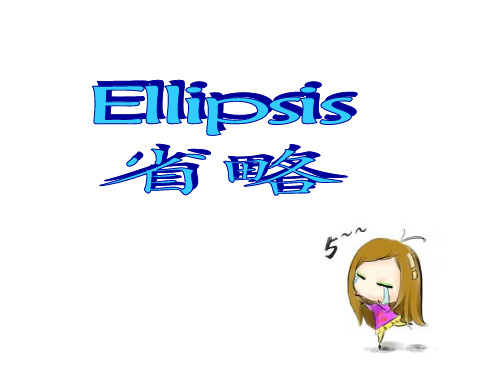
: Unlesshhee is invited, he won’t come.
: Unlesshe is invited, he won’t come. : Whilehhee is doing house work, my father often listens to music. : While he is doing house work, my father often listens to music.
2、省略主谓或主谓语的一部分。如:
(省略主语和谓语)
: What/How (do you think) about a cup of tea ? : Why (do you) not say hello to him ?
3、省略表语。
: –Are you thirsty? – Yes, I am(.thirsty). : His brother isn’t lazy, nor is his sister(.lazy).
※介词的省略※(考点)
1. 一些常和动名词、形容词一起搭配的介词常省 略,而保留其后的 动名词,常见的句型有
spend/waste time (in) doing, lose no time (in) doing; have difficult/trouble (in) doing; be busy (in) doing; stop/prevent sb. (from) doing 等。
: The order that we(sshhoouuldld) stay where we are is very serious and severe.
: It’s very important that students(shshoouuldld) study hard at school.
英语省略大全(初高中皆可用)

省略大全英语中几种常用“省略”的用法总结省略句的概念英语中,为了避免重复,常常省略句子中的一个或几个成分,这样的句子叫省略句。
一、简单句中的省略在对话中,交谈双方都知道谈论的对象,则可以省略句子的主语,省略主语和谓语的现象在交际用语中出现的很多。
1. 省略主语1)祈使句中的主语通常被省略如:(You) Open the door,please.请开一下门。
2) 其它省略主语多限于现成的说法如:a) (I) Thank you for your help. 谢谢你的帮助。
b) (It )Doesn’t matter.没关系。
2. 省略主谓语或主谓语的一部分a) (There is) No smoking. 禁止抽烟。
b) (Is there)anything else ? 还有其他事吗?c) (You come)This way please.请这边走。
d) (Will you) Have a smoke ? 抽烟吗?3. 省略宾语—Do you know Mr. Li ? 你认识李先生吗?— I don’t know (him) . 我不认识他。
4. 省略表语—Are you thirsty ? 你30岁了吗?Yes , I am (thirsty). 是的,我是。
5. 同时省略几个成分—Are you feeling better now? 你觉得好些了吗?—(I am feeling ) Much better(now) 好多了。
(I wish) Good luck (to you) .祝你好运/祝你顺利。
二、并列复合句中的省略在并列句中后边的分句可以省略与前边分句中相同的成分。
如:a) The boy picked up a coin in the roadand (the boy ) handed it to a policeman.这个男孩在马路上拾起一枚硬币并把他交给了警察。
b) Your advice made me happy but(your advice made) Tom angry .你的建议使我高兴但使汤姆生气。
完整版英语省略句的六大总结

完整版英语省略句的六大总结
1.主语省略:当主语已经被上下文所明确时,可以省略主语。
例句:(原句)I am going to the bookstore.
(省略) Going to the bookstore.
2.谓语动词省略:当谓语动词已经被上下文所明确时,可以省略谓语动词。
例句:(原句)She can play tennis very well.
(省略) She can play very well.
3.宾语省略:当上下文中已明确了宾语时,可以省略宾语。
例句:(原句) Would you like to have some watermelon?
(省略) Would you like some?
4.介词省略:当介词与其宾语紧密相连,且已明确时,可以省略介词。
例句:(原句) We are waiting for you in the park.
(省略) We are waiting for you the park.
5.主语从句省略:当主语从句中的主语与句子的主语相同,可
以省略主语从句。
例句:(原句) That he could swim surprised me.
(省略) To swim surprised me.
6.定语从句省略:当定语从句中的关系代词为主语时,可以省略关系代词。
例句:(原句) The book that I borrowed from the library is very interesting.
(省略) The book I borrowed from the library is very interesting.。
英语中的省略

省略不定式保留to 省略不定式保留to
不定式作一些动词的宾语时:love,like,care,wish,hope,expect,prefer, 不定式作一些动词的宾语时:love,like,care,wish,hope,expect,prefer, refuse,mean,try,oblige,advise,persuade,agree,want,afford,forget, refuse,mean,try,oblige,advise,persuade,agree,want,afford,forget, remember,try,manage等 remember,try,manage等 You should have thanked her before you left . I meant to (thank her),but when I was leaving I couldn’t find her anywhere . her),
在would rather…than… 等结构中,不定式符号常常要省略。 I would rather stay at home than (to)go to see a film. to) 当两个或多个不定式并列时,其后的不定式符号可以省略 Her job is to take care of the elders and (to) wash their clothes. 但有对比关系时不可省略 It is easier to say than to do .
定语从句中的省略
在限制性定语从句中,作宾语的关系代词 that,which,whom 可以省略 限制性定语从句中,作宾语的关系代词 that,which, This is the article (that/which) we talked about last week. This is the man (whom/that) I met with. 在direction(方向),way(方式, 注意the way不能用how来引导),distance(距离), direction(方向) way(方式, 注意the way不能用how来引导) distance(距离) time(时间) times(倍数)等后面所接的定语从句中常省略that,which, time(时间),times(倍数)等后面所接的定语从句中常省略that,which,in which I don’t like the way (that/in which) you laugh at her. The distance (which/that) light travels in one second is 300,000 300, kilometers. The direction (in which/that) we move a body can be changed.
英语中的省略现象

省略结构
1.省略的前提条件是必须保持句子意思的完成无缺,不能引起争议和歧义
2.省略往往是为了避免重复,可以承接前面的内容省略(承前省略),有的可以承接后文的内容省略(后指省略)。
He is not only a teacher of English, but also of Chinese. (of 前省略了a teacher)
3.省略的部分要能够“还原”,还原后语法上要求结构对应,逻辑关系正确。
4.定语从句的省略
5.状语从句的省略
标准书面语中,状语从句的省略:表示转折、时间、条件的连词+ 形容词短语/分词短语
错误形式:连词+ 介词短语/名词短语
特例:once 可以加介词短语/名词短语,whatever 可以加名词短语构成状语从句省略。
IF+
6.比较结构中的省略
7.并列结构中的省略
1)省略相同的主语,宾语,连系动词,助动词和情态动词
2)两个句子并列,第一个句子含有be 动词或者become, 第二个句子中的be 动词或become 必须省略,同时,一些重复的名词或形容词也必须省略。
8.习惯性省略
As needed; as planned; as required; as scheduled
Whenever necessary/needed/possible; wherever necessary/needed/possible than ever; than before; than ever before; than usual; than expected;。
英语中常见的省略
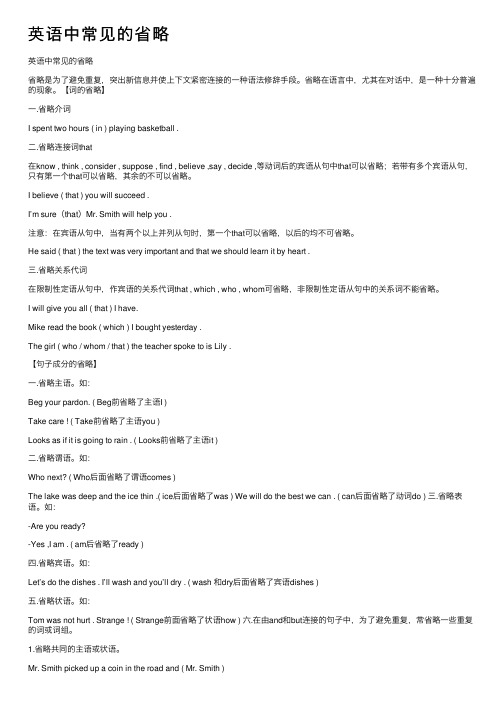
英语中常见的省略英语中常见的省略省略是为了避免重复,突出新信息并使上下⽂紧密连接的⼀种语法修辞⼿段。
省略在语⾔中,尤其在对话中,是⼀种⼗分普遍的现象。
【词的省略】⼀.省略介词I spent two hours ( in ) playing basketball .⼆.省略连接词that在know , think , consider , suppose , find , believe ,say , decide ,等动词后的宾语从句中that可以省略;若带有多个宾语从句,只有第⼀个that可以省略,其余的不可以省略。
I believe ( that ) you will succeed .I’m sure(that)Mr. Smith will help you .注意:在宾语从句中,当有两个以上并列从句时,第⼀个that可以省略,以后的均不可省略。
He said ( that ) the text was very important and that we should learn it by heart .三.省略关系代词在限制性定语从句中,作宾语的关系代词that , which , who , whom可省略,⾮限制性定语从句中的关系词不能省略。
I will give you all ( that ) I have.Mike read the book ( which ) I bought yesterday .The girl ( who / whom / that ) the teacher spoke to is Lily .【句⼦成分的省略】⼀.省略主语。
如:Beg your pardon. ( Beg前省略了主语I )Take care ! ( Take前省略了主语you )Looks as if it is going to rain . ( Looks前省略了主语it )⼆.省略谓语。
英语中的种种省略现象
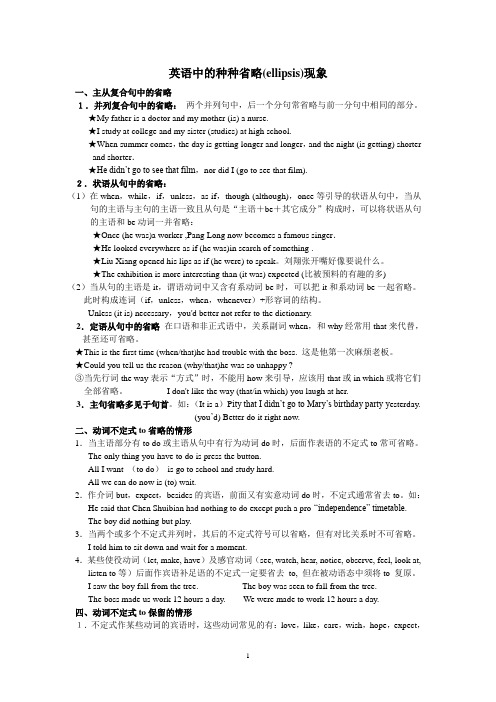
英语中的种种省略(ellipsis)现象一、主从复合句中的省略1.并列复合句中的省略:两个并列句中,后一个分句常省略与前一分句中相同的部分。
★My father is a doctor and my mother (is) a nurse.★I study at college and my sister (studies) at high school.★When summer comes,the day is getting longer and longer,and the night (is getting) shorter and shorter.★He didn’t go to see that film,nor did I (go to see that film).2.状语从句中的省略:(1)在when,while,if,unless,as if,though (although),once等引导的状语从句中,当从句的主语与主句的主语一致且从句是“主语+be+其它成分”构成时,可以将状语从句的主语和be动词一并省略:★Once (he was)a worker ,Pang Long now becomes a famous singer.★He looked everywhere as if (he was)in search of something .★Liu Xiang opened his lips as if (he were) to speak。
刘翔张开嘴好像要说什么。
★The exhibition is more interesting than (it was) expected (比被预料的有趣的多)(2)当从句的主语是it,谓语动词中又含有系动词be时,可以把it和系动词be一起省略。
此时构成连词(if,unless,when,whenever)+形容词的结构。
英语中的省略句
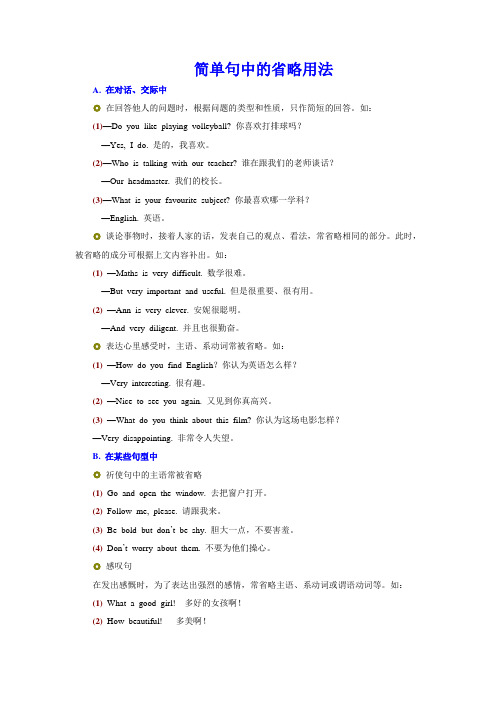
A. 在对话、交际中◎在回答他人的问题时,根据问题的类型和性质,只作简短的回答。
如:(1)—Do you like playing volleyball? 你喜欢打排球吗?—Yes, I do. 是的,我喜欢。
(2)—Who is talking with our teacher? 谁在跟我们的老师谈话?—Our headmaster. 我们的校长。
(3)—What is your favourite subject? 你最喜欢哪一学科?—English. 英语。
◎谈论事物时,接着人家的话,发表自己的观点、看法,常省略相同的部分。
此时,被省略的成分可根据上文内容补出。
如:(1)—Maths is very difficult. 数学很难。
—But very important and useful. 但是很重要、很有用。
(2)—Ann is very clever. 安妮很聪明。
—And very diligent. 并且也很勤奋。
◎表达心里感受时,主语、系动词常被省略。
如:(1)—How do you find English?你认为英语怎么样?—Very interesting. 很有趣。
(2)—Nice to see you again. 又见到你真高兴。
(3)—What do you think about this film? 你认为这场电影怎样?—Very disappointing. 非常令人失望。
B. 在某些句型中◎祈使句中的主语常被省略(1)Go and open the window. 去把窗户打开。
(2)Follow me, please. 请跟我来。
(3)Be bold but don’t be shy. 胆大一点,不要害羞。
(4)Don’t worry about them. 不要为他们操心。
◎感叹句在发出感慨时,为了表达出强烈的感情,常省略主语、系动词或谓语动词等。
如:(1)What a good girl! 多好的女孩啊!(2)How beautiful! 多美啊!一、在对话、交谈中1.回答问题时,往往可省略从句或主句中的某些成分、甚至整个从句或主句。
英语中的省略句和省略句的规则

英语中的省略句是一种特殊的句型,通过省略部分句子成分,使句子更加简洁、流畅。
省略句的使用可以提高句子表达的效果,但也需要注意一些规则。
在英语中,常见的省略句有主语、谓语、宾语和其他成分的省略。
以下是一些常见的省略句规则:1.主语的省略当主语已经在上下文中明确指出时,可以省略主语。
例如:•Who is the winner? (Who: 主语)•Tom is. (Tom: 主语)2.谓语的省略当句子中的谓语动词与上文中的主谓一致时,可以省略谓语动词。
例如:•Have you finished your homework? (Have you: 谓语动词)•Yes, I have. (I have: 谓语动词)3.宾语的省略当宾语是不定式短语、动名词短语或从句时,有时可以省略宾语。
例如:•I want to eat some ice cream. (to eat some ice cream: 宾语)•I want to. (to: 宾语)•She enjoys swimming in the summer. (swimming in the summer: 宾语)•She enjoys it. (it: 宾语)4.其他成分的省略有些介词短语或副词短语在语境中已经明确,可以省略。
例如:•Peter is going to the supermarket. (to the supermarket: 介词短语)•So is Mary. (So: 其他成分)•He said he would visit us tomorrow. (tomorrow: 副词短语)•He said he would. (He: 其他成分)正如以上所述,省略句是一种简化语句结构的技巧,使句子更加简洁。
然而,省略句也有一些注意事项。
首先,省略句要根据上下文进行判断。
如果没有足够的上下文信息,可能会造成误解。
其次,省略句需要遵守语法规则。
英语中的省略现象
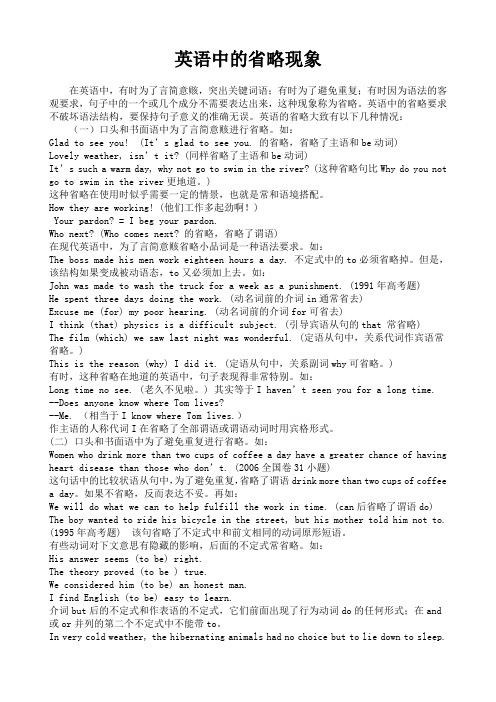
英语中的省略现象在英语中,有时为了言简意赅,突出关键词语;有时为了避免重复;有时因为语法的客观要求,句子中的一个或几个成分不需要表达出来,这种现象称为省略。
英语中的省略要求不破坏语法结构,要保持句子意义的准确无误。
英语的省略大致有以下几种情况:(一)口头和书面语中为了言简意赅进行省略。
如:Glad to see you! (It’s glad to see you. 的省略,省略了主语和be动词)Lovely weather, isn’t it? (同样省略了主语和be动词)It’s such a warm day, why not go to swim in the river? (这种省略句比Why do you not go to swim in the river更地道。
)这种省略在使用时似乎需要一定的情景,也就是常和语境搭配。
How they are working! (他们工作多起劲啊!)Your pardon? = I beg your pardon.Who next? (Who comes next? 的省略,省略了谓语)在现代英语中,为了言简意赅省略小品词是一种语法要求。
如:The boss made his men work eighteen hours a day. 不定式中的to必须省略掉。
但是,该结构如果变成被动语态,to又必须加上去。
如:John was made to wash the truck for a week as a punishment. (1991年高考题)He spent three days doing the work. (动名词前的介词in通常省去)Excuse me (for) my poor hearing. (动名词前的介词for可省去)I think (that) physics is a difficult subject. (引导宾语从句的that 常省略)The film (which) we saw last night was wonderful. (定语从句中,关系代词作宾语常省略。
(完整版)英语省略句的六大总结

英语中的六大省略现象概念:为了避免重复,省略句中的一个或几个句子成分,这种语法现象称为省略1. 简单句中的省略现象(6)名词所有格修饰的名词若表示店铺、 住宅、 教堂或上下文已暗示或明确指出过 的事物。
例如:例:( 1)在对话中,例如:— How is your mother today?— (She is) Much better.(2) 在祈使句中,例如: (You) Open the door, please!(3) 在感叹句中,例如: What a (good) boy (he is)! How (hard) they are working!( 4)表示讲话人的意见和看法, (It) sounds fine to me.(It's a) pity you couldn't come.(5)提问,例如: (Is there) anything wrong? (Have you)found the treasure? 你妈妈今天怎样? 她)好多了。
请开门!多好的男孩啊!他们工作得多努力呀!上下文意思很清楚,例如:你不能来,真遗憾。
发生了什么事吗?你已经找到珠宝了吗? at her mother's (house)在她妈妈家里 at the doctor's (house)在医院里 at the barber's (shop)在理发店里 at the tailor's (shop) 在裁缝店里(7)动词不定式的省略。
式符号 前面出现过的动词在下文再次出现时, to 。
动词不定式的省略,一般只省略动词,而保留符号“ 可以单纯使用不定 to ”。
例如:—Will you go with me? 你愿意跟我一块去吗?—Well, I'd like to(go with you). 我非常愿意。
I'd like to. 也可用I'd love to. /I'd be happy to. 来取代。
英语省略句

高考英语考点-省略句省略句是高考考查的语法重点,又是学习的难点。
在英语中,为了使句子简洁明快,突出重点,常用"省略句",只要不影响句意的表达,能省略的成分尽可能省略。
省略现象随处可见,大致可分为以下几种情况。
一、句子成分的省略1. 省略主语。
如:Haven't seen you for ages!好久不见了!2.省略谓语。
如:(Is there) Anything you want? 你要什么东西吗?(Does) Anybody need help? 有人要帮忙吗?3. 省略宾语。
如:I don't know (where he is ). 我不知道。
4.省略主语和谓语(或谓语的一部分),只剩下表语、宾语、状语或其它成分。
如:(I'm) Afraid I can't come. 恐怕我不能来了。
(Have you) Got any ink? 你有墨水吗?【高考链接】-It’s a long time since I saw my sister.(2007全国卷1)-_________her this weekend?A. W hy not visitB. Why not to visitC. Why not visitingD. Why don’t visit解析:答案为A。
本题考察省略结构,这里why not visit =Why didn’t you visit ,这种既注重基础又兼顾生活交际的试题,其实多数学生感觉很容易能得出正确的A答案。
二、复合句的省略1.在含有状语从句的复合句中由when,while,as, once,whenever引导的时间状语从句;或由if,unless引导的条件状语从句;由though,although,even if ,even though引导的让步状语从句;由as though,as if,as引导的方式状语从句;由because引导的原因状语从句;由wherever引导的地点状语从句,若从句的主句是it或与主句的主语相同,且在谓语中含有be时,常省略从句的主语和be。
英语中几种常用省略的用法总结
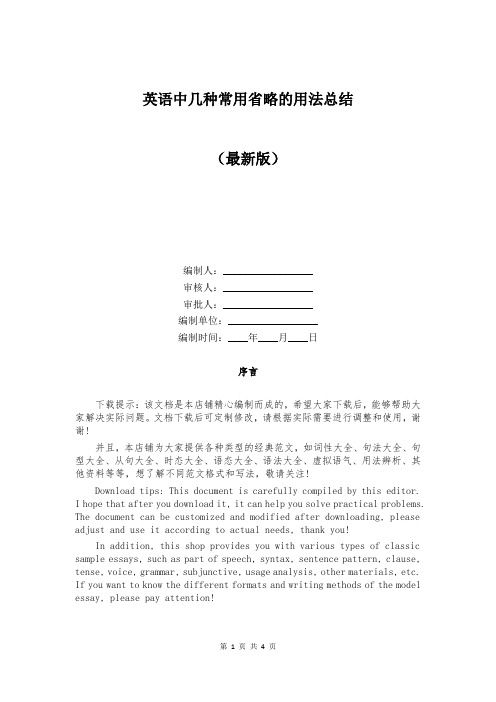
英语中几种常用省略的用法总结(最新版)编制人:__________________审核人:__________________审批人:__________________编制单位:__________________编制时间:____年____月____日序言下载提示:该文档是本店铺精心编制而成的,希望大家下载后,能够帮助大家解决实际问题。
文档下载后可定制修改,请根据实际需要进行调整和使用,谢谢!并且,本店铺为大家提供各种类型的经典范文,如词性大全、句法大全、句型大全、从句大全、时态大全、语态大全、语法大全、虚拟语气、用法辨析、其他资料等等,想了解不同范文格式和写法,敬请关注!Download tips: This document is carefully compiled by this editor.I hope that after you download it, it can help you solve practical problems. The document can be customized and modified after downloading, please adjust and use it according to actual needs, thank you!In addition, this shop provides you with various types of classic sample essays, such as part of speech, syntax, sentence pattern, clause, tense, voice, grammar, subjunctive, usage analysis, other materials, etc. If you want to know the different formats and writing methods of the model essay, please pay attention!英语中几种常用省略的用法总结省略,常见的省略有下列14种情况:1、并列复合句中某些相同成分的省略He often regards English as easy and (he often regards)French as difficult.他常把英语看作是容易学的,而法语是难学的2、在用when,while,if,as if,though(although),as until,whether等连词引导的状语从句中,如果谓语有be,而主语又跟主句的主语相同或是it时,则从句的主语和be常可省略When(water is)heated,water is turned into vapour.水加热时变成气体3、在than,as,no matter what(who等)分句后面常可省略某些成分They do not use more water than(it is)necessary.他们使用的水没有超出需要量4、在know,think,consider,suppose,find,belive,say,decide等动词后面所接的宾语从句中,连接词that常可省略I think(that)it will clear up this afternoon.我想今天下午天会转晴5、在限制性定语从句中,作宾语用的关系代词whom,which,that常省略;在以the same...as和such...as引出的某些定语从句中,也可以省略与主句相同的成分This is one of the best films(that)I've ever seen.这是我所看过的最好的电影6、在以there is开头的句子中,修饰主语的同位语从句的连接词常省略,修饰主语的定语从句的关系代词作主语,有时可以省略There is a table(that)stands in the corner.墙角处放着一张桌子7、用so,not或其他手段来替代上文或问句中的一部分或整个句意--Can he do this work?他能做这件工作吗?--I think so. 我想他行8、在某些动词后的宾语补语和主语补语中可将to be省略These books are thought(to be)very valuable人们认为这些书很有价值9、在“the+比较级...the+比较级...”结构中,有时可省略be 或there beThe higher the temperature(is),the greater the pressure (is)温度越高,压力越大10、某些动词在接that从句时,不用与之搭配的介词We agreed that is was a mistake.我们一致认为,这是一个错误11、用to表示前述动词不定式,其后面有关成分省略You may go home if you like(to)你如果想回家就可回家12、在某些虚拟语气的句子中可以省略shouldI suggest that he(should)study more English before going abroad.我建议他出国前多学点英语13、在用so+that连接的从句中,常省略so或thatWe are very tired,(so)that we had better hurry home.我们很累,所以我们还是赶快回家去吧14、省略介词in的几个固定词组He spends his evenings(in)studying English他把晚上的时间花在学英语上。
- 1、下载文档前请自行甄别文档内容的完整性,平台不提供额外的编辑、内容补充、找答案等附加服务。
- 2、"仅部分预览"的文档,不可在线预览部分如存在完整性等问题,可反馈申请退款(可完整预览的文档不适用该条件!)。
- 3、如文档侵犯您的权益,请联系客服反馈,我们会尽快为您处理(人工客服工作时间:9:00-18:30)。
一、省略句的概说省略句是我们在学习英语过程中能不断体验收获和趣味的一种惯用手法,无论是说话还是写作,都要求生动活泼,简明扼要。
按照语法的分析, 有时句子应具备的成分出于修辞上的需要, 会缺少一个或几个句子语法结构所必要的语言成分,但在一定语境中可独立存在,仍能表达其意义完整并发挥交流功能的句子则被称为省略句。
省略的结果不仅能使句子结构更加精练,而且可起到连接上下文并使相邻词语达到强调的作用。
英语省略句用词简练, 表意简练, 往往收到一定的修饰效果, 句中的某些成分因上下文已提供了充分明确信息或前文已出现过的某些成分,为了避免不必要的重复,也不会引起言语上的误解,并可突出中心词,从而使整文紧密连接的一种修辞手法,其语法现象就是省略。
举个例子:Glad to see you. 这是个简单句,主语I和谓语am可以省略。
省略的形式从单词、短语到分句等都可省略, 而且各有其一定的衔接关系。
二、省略句的分类(一)句中成分的省略1. 主语的省略Beg your pardon. (我)请你原谅。
(Beg前省略了主语I)Come on! 得了吧(你)!(Come前省略了主语You)2. 谓语的省略John is a lawyer,his wife (is) a cleaner.Some of us study Japanese,others (study) English.3. 表语的省略She was a lover of sports as(因为) she had been in her youth(在她年轻的时候).(had been后面省略了a lover of sports)4. 宾语的省略Let’s do the cases. I’ll read and you’ll type.(read和type后面省略了宾语cases)5. 定语的省略I spent part of the money, and the rest I gave.(the rest后面省略了定语of the money)6. 状语的省略She wasn’t cry. Strange! (Strange前面省略了状语how)7. 词的省略1)名词、冠词、物主代词或介词如果与前文重复时,可以省略,如:I like red wine better than white (wine).The lightning(闪电) flashed and (the) thunder crashed.Please take good care of these flowers and (these) plants.We lived in Beijing and (in) Shanghai for some time.2)重复出现的形容词,省略后边的;两个或两个以上被形容词修饰的同一名词,前边的则常被省略。
We are young boys and (young) girls.There were middle-aged (women) and elderly women to attend the meeting;8. 英语中一些固定特殊的省略结构1)在回答一般疑问句的简略答语中,或回答用陈述句,祈使句表示要求、命令的简略回答中,常用Yes /No+主语+助动词,而省略主动词或其它成份,但助动词应和原句的助动词和时间概念须保持相应的一致。
—Could I borrow your dictionary?—Yes, of course you can. (句中could表示委婉语气,并不是过去式,因此答语用can,其后省略borrow my dictionary.)—Don't forget to come to my birthday party tomorrow.—I won't. (祈使句原含有未来的意味,再加上有tomorrow的限制,因此答语用won't,其后省略forget to go you’re your birthday party tomorrow.)2) 同时省掉句子几个部分有时好几个句子成分都被省掉,除了对疑问句的简略回答外,也出现在反意疑问句中。
如:You are a superman,aren’t you (a superman) ?3)在以know, forget, remember等动词结尾的简答句后的子句通常也可省略,以避免重复。
—Who won the football match last night?—Sorry, I don’t know (who won the football match last night.)4)在以if, when,though,as,as if 等连词引导的从句中,如从句中主要动词是be,可将主语和动词be省掉。
He is very good at dancing, though (he is) very old.The boy looked as if ( he were ) afraid of nothing.5)so,nor/neither 用来表示“……也一样”时的省略结构—I am a student.—So am I (a student).—We haven't been there.—Neither (Nor) have we (been there).(二)句中结构的省略1. 简单句的省略1)名词所有格之后的省略He is going to his uncle’s (house).2) 含there be结构中的省略(Is there) Anything wrong?3) 独立主格结构中的分词如为being或having been时的省略The examination (being) over, we all left the school.4) 不定式的省略(1)并列的不定式Her job is to take care of the elders and (to) wash their clothes.(2)为避免重复, 作某些动词hope, want等宾语或tell, order, ask的宾补时,省略不定式短语, 只保留不定式符号to.The child wanted to play in the street, but her mother told her not to.(此句中not to 后省略了和上文相重复的play in the street.).(3)感官动词see, hear, feel, notice, hear或使役动词let, make, have,等后跟不定式作宾补时省略to.I saw the girl cross the street.I had my father repair my bike.注意:当感官动词与使役动词用于被动时,需恢复to的省略! 如:The girl was seen to cross the street.(4)有had better, would rather, can’t but 或Why not等句型后面直接跟动词原形,实际上是接省to的不定式。
You had better tell me the truth.I could not but (to) laugh at him.Why not go and ask the teacher for help?(5)在回答问句及其它形式的答语中,如有和上文重复的不定式时,在答语中只保留其不定式符号to,而把动词和其它部分省略。
—Would you like to come to dinner tonight?—I'd like to. But I'm too busy. (此句中的I'd like to 后省略了come to dinner tonight.)5) 介词(或介词短语)的省略(1)动名词前面的介词in在一定条件下常被省略We spent a large sum of money (in) building the mansion.而当spend money in doing sth. 结构用于被动语态时in不能省略A large sum of money was spent in building the mansion.(2)near或opposite作形容词表示“在…的附近”或“在…对面”时后接的介词to可省略It is near (to) the airport, opposite (to) the supermarket.(3)of +形容词+名词作补语表示大小、年龄、形状、颜色或价格时of常被省略We are(of)the same age, I suppose.(4)含有side, height, length, size, shape等惯用语前介词on有时可被省略Try to keep your discourse(on)this side of 3000 words.(5)有些动词、名词、形容词习惯搭配介词短语, 在以what, when, how, whether, that出现的从句或不定式短语之前有时被省略介词短语as to.Be careful (as to) how you do that.6) 同源宾语的省略同源宾语的修饰语是形容词最高级或含有最高级意义时可以省去该同源宾语During the football match, the fans all shouted their loudest (shout).She sang her sweetest (song).7) 英语中惯用的省略句型即,What/How about后只跟名词、代词或动名词(短语),以及感叹句中的省略现象。
How about the two of us taking a walk down the garden?What a beautiful view (it is)!2. 并列句中的省略1) 并列句的省略是最常见的,一般说来,在后一并列句中凡是与上文相同的成分通常都会被省略。
To some smile is very easy, and to others (smile is) so hard.2) 简单句的并列结构中也常有省略的做法We may go there by train or (by) air.3)并列平行结构有时会出现在状语从句中As families move away from their stable community, their friends of many years, their extended family relationships, the informal flow of information is cut off, and with it the confidence that information will be available when needed and will be trustworthy and reliable.(此句中,前一个分句带一个As引导的状语从句,状语从句中move away from 后为并列平行结构,their…,their…,their…在and后的分句中,the confidence后省略了is cut off.)3. 复合句中的省略1)复合句中从句的句尾和主句相重复时从句的句尾部分可省掉Mary is going to sweep the floor because Alice won't (sweep the floor).2)含有定语从句的复合句(1)定语从句中可以省略作宾语的关系代词;非正式文体中,也可省略关系副词when或why.I shall never forget the day (when) I entered TV University.I like the film for the very reason (why) you dislike it.(2)关系代词as后面的主谓结构也可省略He gave the same answer as (he had given) before.3)含有宾语从句的复合句(1)在两个并列的that从句如主动词及其宾语、表语、状语等都一样时可将第二个that从句的主动词及随带成份省略。
